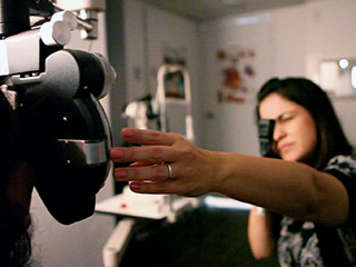This page lists the specialist who may be a part of your care prior to, during and after your transplant.

Ophthalmologist
An ophthalmologist is a doctor who specializes in the eyes. This doctor will check the health of your eyes, especially if you:
- are taking medicines that can cause changes in your eyes
- have eye disease that is associated with your kidney disease
- have very high blood pressure.
Dentist
Part of routine health care is taking care of your teeth. It is important to discover any problems that could lead to infection before your transplant. After your surgery, you will be on medicines that will weaken your immune system. One result of this is that any gum infections that are not found and treated early enough could become serious.
Your local dentist or a dentist based in the hospital can check your teeth and gums to make sure that no major problems need to be fixed before your transplant surgery. This dentist will also need recent dental x-rays so they can do a full check of your teeth.
If you have seen your regular dentist in the past six months, bring a letter from them that confirms your dental health and when you last had a check-up. If you have not seen your regular dentist in the past six months, make an appointment with them or arrange to see a dentist in the hospital.
Regular check-ups are also important for you while you are waiting on the transplant list. As always, there is a cost to see the dentist.
Ear, nose and throat (ENT) specialist (or otolaryngologist)
You will see an ENT specialist if:
- you tend to get ear, nasal (nose), sinus or throat infections
- your hearing test results are abnormal.
This specialist will decide if you need treatment to prevent future infections.
Adolescent medicine specialist
This doctor specializes in helping teenagers deal with issues such as puberty, drugs, alcohol and birth control while living with a chronic disease. They know a lot about teenagers’ normal growth and development.
In the assessment process, they will try to get to know you and understand how you make decisions. They will also help you to figure out some of the problems you may have after transplant and suggest how to avoid or cope with them.
Adolescent medicine specialists usually meet with teens without their parents and will keep information confidential (just between you and them) unless you are at serious risk.
Note: If there is no adolescent medicine doctor connected to your healthcare team, you can bring up any questions with your social worker or transplant nurse.
Teacher
A teacher at the hospital will talk to you about how you are managing your school work now and will help you find ways to keep up with your school work when you have a transplant. With you, they will plan the best way to talk with your teachers at school to get the work you need to keep up with your classmates.
Allergist
If you have an allergy, but it has not been confirmed through formal testing, you will be asked to see an allergist. Your transplant team will want to know exactly what medicines you can and cannot have at the time of your transplant.
Hematologist
A hematologist is a doctor who specializes in different blood disorders, clotting and bleeding. You will see them so they can make a plan to minimize the risk of clotting or bleeding at the time of your surgery. An appointment will be made if tests are abnormal or there is a family history of clotting or bleeding problems.